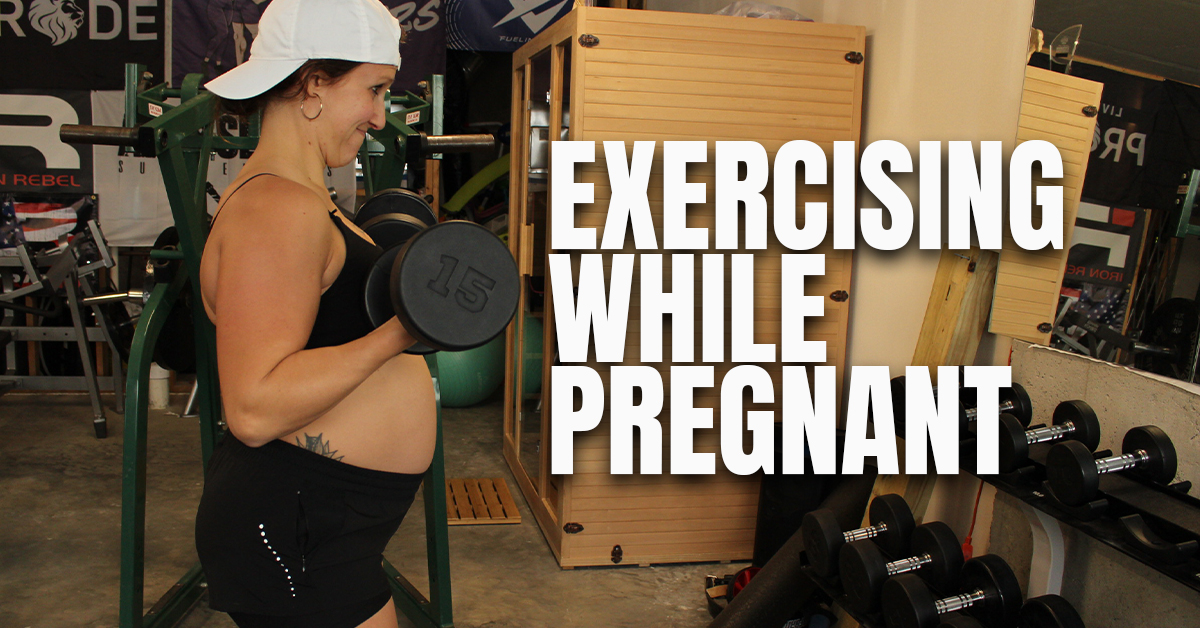
Exercise During Pregnancy
I remember one specific day when I was in college at the gym. I saw a pregnant woman who looked like she may be headed to the hospital after her workout to have her baby. I remember thinking, "Wow! I want that to be me. I will workout when I am pregnant. Nothing will stop me!" Well, then I peed on a stick and found out I was pregnant. One of my very first questions when I found out I was pregnant was "Can I still workout like I do daily?" Of course I knew woman do, but I also knew many woman who had complications or were advised not to. This is a common question or worry, especially for women who have always been very active and can't imagine a life without it! While many assume they can do some type of activity, a common question I often get is "What exercises do you avoid or can you not do?"
While there are restrictions on what I can do, there are so many benefits that go along with being active during pregnancy. Both strength training and cardiovascular exercise is beneficial! Not only for mom but also for the fetus! This is one article I am so excited to write and share with all of you!
Benefits of Exercise During Pregnancy
While it is a common question, exercise is widely accepted and encouraged during pregnancy. There are many benefits from exercise of all types during pregnancy.
The American Pregnancy Association encourages exercise during pregnancy for many reasons listing the following benefits:
- Reduces backaches, constipation, bloating, and swelling
- May help prevent or treat gestational diabetes
- Increase energy
- Improves mood
- Improves posture
- Promotes muscle tone, strength, and endurance
- Improves sleep better
- Regular activity also helps keep you fit during pregnancy and may improve your ability to cope with labor
Decreased Risk of Cesarean Section and Assisted Vaginal Deliveries
Multiple studies have shown a reduced risk of Cesarean Section birth and instrumental vaginal deliveries in women who exercised during their pregnancy. There are also studies that suggest that exercise during pregnancy will decrease length of labor during delivery.
Decreased Risk of Excessive Weight Gain During Pregnancy
Excessive weight gain alone is known to increase risk of many concerning conditions during pregnancy such as preeclampsia, gestational diabetes, perinatal depression and also postpartum weight retention according to this systematic review. Excessive weight gain is considered at your first prenatal visit depending on your BMI. If your BMI is in the normal range (18-25), a pregnant woman should gain 25 to 35 pounds whereas overweight (BMI 25-29.9 kg/m2) and obese (BMI >30 kg/m2) women should aim to gain 15 to 25 pounds and 11 to 20 pounds according to the guidelines from the Institute of Medicine's guidelines. In this study, approximately 40% of normal-weight women and 60% of overweight women gained more weight than the upper limit of the respective range recommended by the Institute of Medicine. This seems like far too many! Exercise can help manage weight gain during pregnancy, preventing these conditions.
Improved Postpartum Recovery
It is also believed that being active during pregnancy will improve your recovery postpartum and help getting fit again after baby. In my personal opinion, I completely believe this! I cannot imagine not working out for 9 months and trying to get back into shape without exercising throughout both my pregnancies. Postpartum recovery is hard enough. Anything that may contribute to speeding up and improving that recovery I would definitely encourage!
Decreased Risk of Depression and Anxiety Peri- and Postpartum
Mood, depression and anxiety are major concerns during pregnancy and postpartum. I can personally add to this as a woman who did experience some depression postpartum and was actually prescribed antidepressant medications that I chose to wait to take. According to this clinical review , it can be concluded that physical activity reduces the symptoms of depression during pregnancy and can be a form of safe preventive treatment. Depression and mood is a focus during pregnancy and postpartum for physicians for a large reason as it is very common for women to experience! I am a strong believer in physical activity truly combatting the risk and being successful in treatment in general for depression and anxiety.
Increased Energy and Less Fatigue During Pregnancy
As many know, low energy and fatigue is one of the most commonly reported symptoms from pregnant women. According to this study, 94.2% of women suffered from fatigue during pregnancy. This can be attributed to many different reasons including disrupted sleep, hormonal changes, decreased blood sugar and blood pressure according to APA. Multiple studies support pregnant women feeling less fatigue and more energy if they regularly exercise during their pregnancy. It is believed that physical inactivity contributes to fatigue and lack of energy during pregnancy. According to this study , most pregnant women increase feelings of energy (>88%) and reduce feelings of fatigue (>76%) after acute low-to-moderate intensity weight lifting.
Benefits for Baby from Exercise
While mom's health during pregnancy is super important, we can't forget about the beautiful little miracle growing inside of us! Here are a few of the benefits for your baby when active and exercising during pregnancy.
Your baby gets a brain boost when mom is active and exercising! This is probably one of the coolest benefits I have heard due to exercising. In a study, they observed children at age 1 of mothers who exercised during pregnancy vs a control group who did not. The children from women who exercise group had higher language score at age 2 years old and a higher cognitive score at age 4 years. So in other words, do it for your babies brain!
Baby is less likely to be underweight at birth. Exercising has been suggested by research to prevent hypertension during pregnancy. Hypertension, or high blood pressure, is shown to reduce blood flow to the placenta making it harder for the fetus to get the nutrients, food, and oxygen needed to grow often leading to low birth weight . According to this study, aerobic exercise for about 30–60 min two to seven times per week during pregnancy compared to a more sedentary pregnancy, is associated with a significantly reduced risk of gestational hypertensive disorders overall, gestational hypertension, and cesarean delivery.
Babies heart may be healthier due to mom's exercise as well. There are studies that show active pregnant moms had babies with lower heart rates both during pregnancy and after birth. This suggests mom's active lifestyle was making the fetus's heart stronger and healthier as well!
An easier delivery was shown in studies in mothers who were active and exercised during pregnancy. Studies have show that the fetus showed fewer signs of distress during delivery with moms who exercised regularly.
If these are not enough reasons to exercise during pregnancy, I am not sure what would convince you. There are few to no reasons not to exercise during pregnancy! So the next question is how to get started and what you should avoid with exercise during pregnancy!
Where To Start with Exercising During Pregnancy
There are many changes in our bodies during pregnancy that not only affect exercising, but affect everything! Our joints during pregnancy are more flexible due to a hormone called Relaxin that causes our joints, muscles and ligaments to soften and relax. This allows for our body to stretch, including our pelvis, to prepare for baby to grow and our bodies to give birth. As you can imagine, this affects our ability to exercise during pregnancy. This affects both your joint strength and stability.
When exercising during pregnancy, it is important to consider how active and what you were doing prior to pregnancy. The first advice I received from my OBGYN was to not increase what I was doing prior to pregnancy. With that being said if you were not active at all, 150 min of exercise per week or about 30-60min of walking 4-5 days a week is advised no matter what you were doing prior to pregnancy. It is always a good idea to have a clear conversation with your provider to be there are no risks with your pregnancy specifically with exercise.
The best advice you can receive is listen to your body. Your body with naturally give you signs when you need to slow down or reduce the level at which you are exercising. You should never workout to breathlessness or exhaustion as this is a concern if you are not getting enough oxygen, this may be a sign your baby or fetus is not getting enough oxygen either.
Weight training should be focused on improving your tone, abdominal and pelvic floor strength. This is one area I wish I had focused on more during my first pregnancy! Avoid lifting above your head and using weights that may strain your lower back as your lower back is already often a weakened area during pregnancy. This is a common area for pain for pregnant women. According to APA your second and third trimester, avoid exercises where you lie on your back as it can decrease blood flow to your uterus! This is when I start modifying and doing incline exercises e.g. incline chest press instead of flat bench.
Stretching is going to be your best friend during pregnancy. While stretching and mobility is always important for exercise, it is even more true during pregnancy. Stretching can combat and even prevent some of the aches and pains you may have with your changing your body.
There are exercises that will help prepare our bodies for labor. Squatting during labor can help open your pelvic outlet for baby! Practicing squatting throughout your pregnancy, even without weight, is a good idea. You may need to adjust your stance, especially as baby grows! Pelvic tilts strengthen your muscles in your abdomen and relieve some of the back pain and pressure many women experience during pregnancy. Although its a small movement, it is effective!
Pelvic floor training and exercises has many benefits. This is not the typical type of exercise we may add to our routine, but there are clear benefits during pregnancy. Benefits include preventing urinary incontinence, pain and prolapse. Effects of pelvic floor muscle training allowed significant improvement in the quantity of urinary leakage and an increase in the strength of the pelvic floor muscle according to this study.
When You Should Stop Exercising
There are warning signs you should always be aware of when exercising during pregnancy that tell you to stop immediately and notify your provider. According to APA, here are some of the warning signs to watch for:
- Vaginal bleeding
- Unusual pain
- Dizziness or lightheadedness
- Unusual shortness of breath
- Racing heartbeat or chest pain
- Fluid leaking from your vagina
- Uterine contractions
- Muscle cramps
- Stop if you feel tired, too hot, cramped, lightheaded, or dizzy
There are plenty of conditions that may prevent you from being able to exercise during pregnancy. This is why it is important to have an open conversation with your provider and make sure they are aware you are being active. Be sure to continue to ask if it is okay to continue to workout if any new conditions and risks arise. This is important for the safety of you as mom and for your baby.
My Experience with Exercise During Pregnancy
My first pregnancy, my symptoms were much more uncomfortable than my second. I was nauseas throughout with no appetite. Both pregnancies, my first trimester I was fatigued and nauseas to the point that I would struggle to workout. I still tried and would get around 3-4 workouts in a week. Once you hit second trimester, many women experience more energy and less fatigue. Many who had nausea first trimester often feel relief. This second pregnancy, I did have my nausea decrease around 14-15 weeks! This has made exercising much more tolerable and enjoyable.
My personal experience with exercising during pregnancy is giving myself the grace to know that I will not be able to do the same exercises, weight or run as if I was not pregnancy. It is about maintaining everything I can but realizing that my workouts are going to be different. Every workout completed is taken as a victory! I don't feel the same during my workouts as I do when not pregnant, but it still gives me pride and more energy throughout the day!
One big difference I notice during pregnancy is my recovery is much slower and I feel much more sore for a longer period of time. I have been able to track my protein intake which I did thought would help but I continue to feel this. I have yet to find a true reason I may feel this. There are not any clinical studies that give a reason as to why muscle recovery may be affected that I can find.
I keep a close eye on my heart rate during my workouts and I do notice that my heart rate rises much quicker and with easier movements than ever before. I get short of breath much easier, even just walking up the stairs which is not typical for me. This is something to stay cognizant of to be sure to give yourself enough recovery and rest periods.
I do feel my recovery postpartum would take much longer if I did not stay active and exercise throughout! Postpartum is hard enough and every woman's experience is different. Anything I can do to help this process is something I will happily make time for.
Final Takeaway
I would highly recommend making the time to stay active and add exercising to your routine during pregnancy. There are many clear benefits not only for mom, but also for the fetus! These benefits are not only isolated to during pregnancy or during labor and delivery, but also carry over to postpartum. The exercises or workouts do not need to be intense. You will need to make some modifications, but any type of movement and exercise during pregnancy will be beneficial. I do hope this inspires even just one woman who may not have decided to be active during pregnancy to add exercising to their routine! Exercise and staying active is always best paired with healthy nutrition. If you incorporate both exercise and healthy nutrition to your routine, there is no doubt you will notice a significant difference in your pregnancy and postpartum journey!







